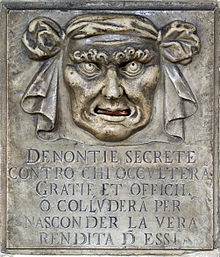
A Letter of Denunciation is a form of document common to many societies intended to inform the authorities of the religious, moral, ideological or political unorthodoxy of the subject of the letter. Such a letter might be signed or anonymous and typically has no legal force (unlike a criminal complaint or indictment). Rather it is an illocutionary act intended to prompt an investigation by the authorities into the subject of the letter. Secret denunciations were perhaps first institutionalized during the principate period of the Roman Empire and the practice can be traced through many early modern states, however they came to have particular significance during the French Revolution and in the totalitarian regimes of the twentieth century where it was widely encouraged. Though informing of some kind or other is common to every society the practice is a salient characteristic of surveillance states and police states where it is pervasive.
History
editAlthough the practice of secret denunciation can be found as far back as the delatores of the Augustan period of the Roman Empire,[1] the documentary history of the procedure traces back to the early modern period where denunciation became an instrument of statecraft. Notably the Republic of Venice had, by the late sixteenth century, established an intelligence service (Inquisitori sopra li segreti) under the Council of Ten which encouraged the reporting of perceived threats to state security. To facilitate this there were created a number of bocche di leone or lion’s mouths, which were post boxes sometimes sculpted in the form of lions where letters could be deposited.[2] A law requiring anonymous letters to be witnessed was introduced in 1542 to stem the flood of accusations that were received, however evidence suggested this did not check the popularity of denunciations. Prominent victims included Bruno and Casanova.
A proclamation, issued in December 1793 by the Commission Temporaire in Lyon invited citizens to: “Denounce the crimes, denounce the criminals, a double reward awaits you: the voice of your conscience, for denunciation is a virtue; and a legitimate reward, for the National Convention is just and desires that each virtuous act should be a means by which the sans-culotte may improve his lot....” Here at the beginning of the Terror it was made explicit that informing was a citizen’s duty and of material benefit to them. This was the end-point of the extra-judicial system of informing that had grown up since the earliest days of the revolution. A comité de recherches to which concerns about public security could be addressed was first proposed in the National Assembly on July 28 1789. The Commune of Paris set up its own comité de recherches in October 1789 to receive denunciations and called upon citizens to reveal knowledge of plots against the public good. The commune made explicit the distinction between denunciation and depositions, the latter being evidence which could be presented to an inquiring magistrate as a basis for prosecution.[3] Submissions to these committees, which proliferated over time and had been endowed with powers of arrest, were public. However, it was evident that the committees, along with the revolutionary tribunals, had become captured by the radical Jacobins and were a source of factional power outside the Convention. By March 1793 comités de surveillance were established by decree where signed denunciations could be submitted behind closed doors. The system of denunciation along with the Law of Suspects were the state instruments that were to make the Terror possible.
The growth of this system did not occur without criticism and opposition. Diderot's encyclopedia frames the terms of the revolutionary debate in terms of intentions where it distinguished between délation and dénunciation: "One is inclined to think that the delator is a corrupt man, the accuser an angry man and the denouncer an indignant man".
Russia, Nazi Germany, Occupied France, GDR.
Most recently the South Yorkshire Police in the UK have invited the public to report non-crime hate incidents.
See also
editNotes
edit- ^ The term delatore was first recorded in the lex coloniae Genetivae Iulia sive Ursonensis in the 1st c CE. It is evident from Tacitus Annales 3.25, 3.28.3. that the lex Iulia and the system of denunciation had inadvertently caused widespread spying and informing such that attempts to curb the procedure of delation were made during the Claudian period and later. See Cairns, p.215
- ^ Iordanou, Venice’s Secret Service. p73?
- ^ Lucas, 1996, p.771
Bibliography
edit- Sheila Fitzpatrick, Accusatory Practices: Denunciation in Modern European History, 1789-1989, University of Chicago Press, 1997
- Matylda Włodarczyk, Infinitives In The 1820 Settler Letters Of Denunciation: What Can A Contextualised Application Of Corpus-based Results Tell Us About The Expression Of Persuasion?, Poznań Studies in Contemporary Linguistics 46(4), 2010, pp. 533–564
- Sheila Fitzpatrick, Robert Gellately, Introduction to the Practices of Denunciation in Modern European History, The Journal of Modern History, Vol. 68, No. 4, Practices of Denunciation in Modern European History, 1789-1989 (Dec., 1996), pp. 747-767
- Colin Lucas, The Theory and Practice of Denunciation in the French Revolution, The Journal of Modern History, Vol. 68, No. 4, Practices of Denunciation in Modern European History, 1789-1989 (Dec., 1996), pp. 768-785
- Sheila Fitzpatrick, Signals from Below: Soviet Letters of Denunciation of the 1930s, The Journal of Modern History, Vol. 68, No. 4, Practices of Denunciation in Modern European History, 1789-1989 (Dec., 1996), pp. 831-866
- Benn Williams, Letters of Denunciation in the Lyon Region, 1940-1944, Historische Sozialforschung, Vol. 26, No. 2/3 (96/97), Denunciation in the 20th Century: Between Comparatistic and Interdisciplinarity (2001), pp. 136 -152
- Patrick Bergemann, Judge Thy Neighbor: Denunciations in the Spanish Inquisition, Romanov Russia, and Nazi Germany, Columbia University Press, 2019
- Xing Lu, Rhetoric of the Chinese Cultural Revolution: The Impact on Chinese Thought, Culture, and Communication., University of South Carolina Press, 2004.